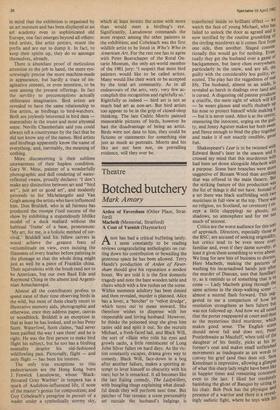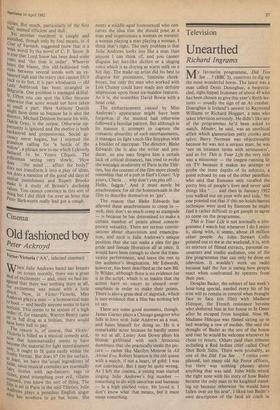Theatre
Botched butchery
Mark Amory
Arden of Faversham (Other Place, Strat- ford)
Macbeth (Memorial, Stratford) A Coat of Varnish (Haymarket)
Anon has had a critical buffeting lately. I seem constantly to be reading reviews congratulating anthologists on cut- ting down his contribution or bewailing the generous space he has been allowed. Terry Hands's production of Arden of Faver- sham should give his reputation a modest boost. We are told it is the first domestic tragedy and note the bare wooden table and chairs which with a few rushes set the scene. Within moments adultery has been denied and then revealed, murder is planned. Alice has a lover, a 'botcher' or 'velvet drudge', which turns out to mean steward. She therefore wishes to dispense with her respectable and loving husband. However, he thinks the poisoned soup she gives him tastes odd and spits it out. So she recruits Michael, a fresh-faced lad, and Black Will, the sort of villain who rolls his eyes and growls oaths, a little reminiscent of Long John Silver fallen on hard days. As the vic- tim constantly escapes, drama gives way to comedy. Black Will, face-down in a bog after another failure, makes a sporting at- tempt to lever himself to obscurity with his toes; but he is remarked. It all becomes like the last Ealing comedy, The Ladykillers, with bungling thugs explaining what dread- ful deeds they will perform next time. But patches of fear remain: a scene presumably set outside the husband's lodgings is
transferred inside to brilliant effect — we watch the face of young Michael, who has i failed to unlock the door as agreed and s
now terrified by the routine grumbling of the circling murderers as it comes first from one side, then another. Staged conven- tionally this would go for nothing. Even- tually they get the husband over a game of backgammon, but leave clues everywhere, particularly in the snow, and are all, the guilty with the considerably less guilty, ex- ecuted. The play has the raggedness of real life. The husband, almost in an aside, Is revealed as harsh in dealings over land and is cursed. A disgusting old painter produces a crucifix, the mere sight of which will loll
— he wears glasses and stuffs rhubarb tiFt his nose to protect himself while making it
— but it is never used. Alice is at the centre, reassuring the innocent, urging on the gull' ty, and Jenny Agutter makes her both sweet and fierce enough to bind the play together and make it if not exactly credible, good fun.
Shakespeare's Lear is to be twinned with Edward Bond's later in the season and It crossed my mind that this murderous wife had been set down alongside Macbeth with a purpose. Some bare branches were more suggestive of Birnam Wood than anything that was offered in the main theatre. But the striking feature of this production was the list of things it did not have. Instead of a set there was black scaffolding with two musicians in full view at the top. There was no religion, no Scotland, no ceremony (ex- cept a little clappping) no ghosts, no shadows, no atmosphere and for me not much of interest.
Critics are the worst audience for this sort of approach. Directors, especially those at the RSC, are accused of seeking originalitY, but critics tend to be even more over- familiar and, even if they damn novelty, at least it gives them something to write about. We long for new bits of business to discuss; Here Macbeth, making the gestures 01 washing his incarnadined hands just after the murder of Duncan, uses that familial' ty, as it reminds us of something that is to come — Lady Macbeth going through the same actions in the sleep-walking scene -- almost a mental flash forward. This sq" gested to me a comparison of how his resolution strengthens as hers falters but was not followed up. And how we all noted that the porter reappeared at court and then as the mysterious third murderer, which makes good sense. The English scene should never fail and does not; peter Postlethwaite as Macduff, when told of the slaughter of his family, picks at his 10- former's coat and makes small unfinished movements as inadequate as are words to convey his grief (and thus does so). Sara Kestelman is impressive, allowing a glimpse of what this sharp lady might have been like in happier times and remaining consistent even to the last. I liked her resolutely banishing the ghost of Banquo by sitting in his chair. Bob Peck has the physique and presence of a warrior and there is a reveal- ingly sadistic fight, where he toys with his viclirn. But much, particularly of the first half, seemed efficient and dull. Yet another murderer is caught and Punished, though only by foul means, in A Coat of Varnish, suggested (now that is a Weak word) by the novel of C. P. Snow. It is true that Lord Snow has been dead some Years and 'the time is today'. Whoever bears the blame, this old-fashioned tosh sinks between several stools with an ex- hausted sigh and the starry cast cannot lift it back to its feet. It is part whodunnit — old Lady Ashbrook has been strangled in Belgravia. One problem is managed skilful- 'Y. Often you can spot the killer because otherwise that actor would not have taken s0. small a part. Here Anthony Quayle might have done so because he is also the director, Michael Denison because his wife, leie Gray, is the corpse. Otherwise op- portunity is ignored and the motive is both hackneyed and preposterous. Social ac- curacy never begins, but I enjoyed the grandson calling for 'a bottle of the widow', a phrase new to me which I cleverly deduced to be Veuve Cliquot. The Policeman saying very slowly, 'How does • .. the mind ... affect the body?' does not transform it into a play of ideas, nor does a mention of the good old days of capital punishment and Rupert Brooke make it a study of Britain's declining values. You cannot convince in this sort of thing but I did think for over an hour that Peter Barkworth really had got a cough.



































 Previous page
Previous page